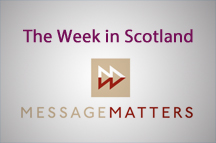 Big weeks in Scottish politics have been relatively common in recent times. Some, like indyref1 and the 2015 General election week have rocked the boat beyond our shores. Others, like this week, will be less noticed from afar, but are clearly very significant nevertheless.
Big weeks in Scottish politics have been relatively common in recent times. Some, like indyref1 and the 2015 General election week have rocked the boat beyond our shores. Others, like this week, will be less noticed from afar, but are clearly very significant nevertheless.
Since devolution, the Holyrood bubble has been one dominated by spending - “we’ll spend the money we have been given better than you” has effectively been the clarion call in just about every Scottish party manifesto since 1999. Not any more - this week has clearly broken new ground and established some interesting territory for political battles to come.
And it has taken one of the - so far - quieter voices at Holyrood to establish a new debate. Suddenly, with Kezia Dugdale’s speech on Tuesday, the Scottish Labour leader has cemented the impression that the debates of the future will be different than those of the past. Suddenly, we’re now talking about tax.
Admittedly, there have been minor infractions into this territory before - The ill-fated “Penny for Scotland” nationalist campaign in 1999, lasted until 2002 before it finally fell foul of John Swinney’s belated policy review. The Tories have often hinted about reducing the tax burden on Scotland’s people, without having the remotest chance of seeing it happen, and the worthy Lib Dem leader Willie Rennie has recently advocated raising tax by a penny in the pound to pay for better education.
But the current Scotland Bill, and the last Scotland Act, have fundamentally changed the terms of debate, and to her credit Dugdale has been the first to test the political temperature on tax rises. She has done so in the knowledge that she has little to lose - May’s elections look like a looming disaster for Scottish Labour and her strategists have clearly decided that big moves are required to at least get the Party talked about, at least in terms other than “looming disaster”.
 So it was that Kez has proposed growing the size of public expenditure in Scotland by raising Scotland’s basic rate of income tax by 1%. Not exactly a revolutionary move, but one which will test the public’s appetite for reversing not just the rhetoric of austerity, but the reality. In doing so, she has sought to put the SNP on the back foot for oft-protesting about London cuts to public expenditure, but steadfastly refusing to do very much to reverse them using the tools available.
So it was that Kez has proposed growing the size of public expenditure in Scotland by raising Scotland’s basic rate of income tax by 1%. Not exactly a revolutionary move, but one which will test the public’s appetite for reversing not just the rhetoric of austerity, but the reality. In doing so, she has sought to put the SNP on the back foot for oft-protesting about London cuts to public expenditure, but steadfastly refusing to do very much to reverse them using the tools available.
Now, to say that the nationalists are on the back foot to Labour is stretching reality - they have the confident swagger around Holyrood that sits easily on the shoulders of any party sitting at 57% support in the polls. But I’ll wager this move will at least give them cause for some thought.
John Swinney, easily characterised as Scotland’s favourite family accountant, has built a reputation on careful stewardship of Scotland’s finances, cleverly managing to do just enough social democratic tinkering to keep his Party happy, whilst refusing to increase the tax powers that were within his grasp. Whether it is business rates or council tax, he has broadly sought not to spook the horses. The trouble is, that does open up a line of attack on the Government for being too centrist and responsible, when some red meat increases are required to keep the new 100,000 members happy. Even Swinne will recognise that the Scottish Government can only reverse the impact of UK Government changes - like the Bedroom Tax - for so long without growing his Scottish revenues.
I’m pretty sure that the planned course of action was to quietly see out this election, before the latest transfer of powers from Westminster allowed Holyrood to increase tax differentially and do to income tax what he sought, eventually, to do with LBTT (the Scottish replacement for Stamp Duty) - namely reduce the burden on those seeming to have least, and raise it on those with most.
What this latest spat has demonstrated is that, at last, we have the most modern Parliament building hosting a modern, grown-up debate on tax and spend. It’s the debate we have waited 16 years for and it is the debate that will surely define the future fault-lines in Scottish politics. That will present opportunities for all sides to genuinely enthuse the electorate with different visions for Scotland’s future.
Of course, whether this bold first step for Kezia will reap dividends is hugely open to question. Whether it represents a move towards some light at the end of the tunnel for Labour prospects north of the Border, or just an oncoming train hurtling towards them, is yet to be seen. But to her credit, the political classes and - whisper it quietly - even some of the public might just be talking about Scottish Labour again.














